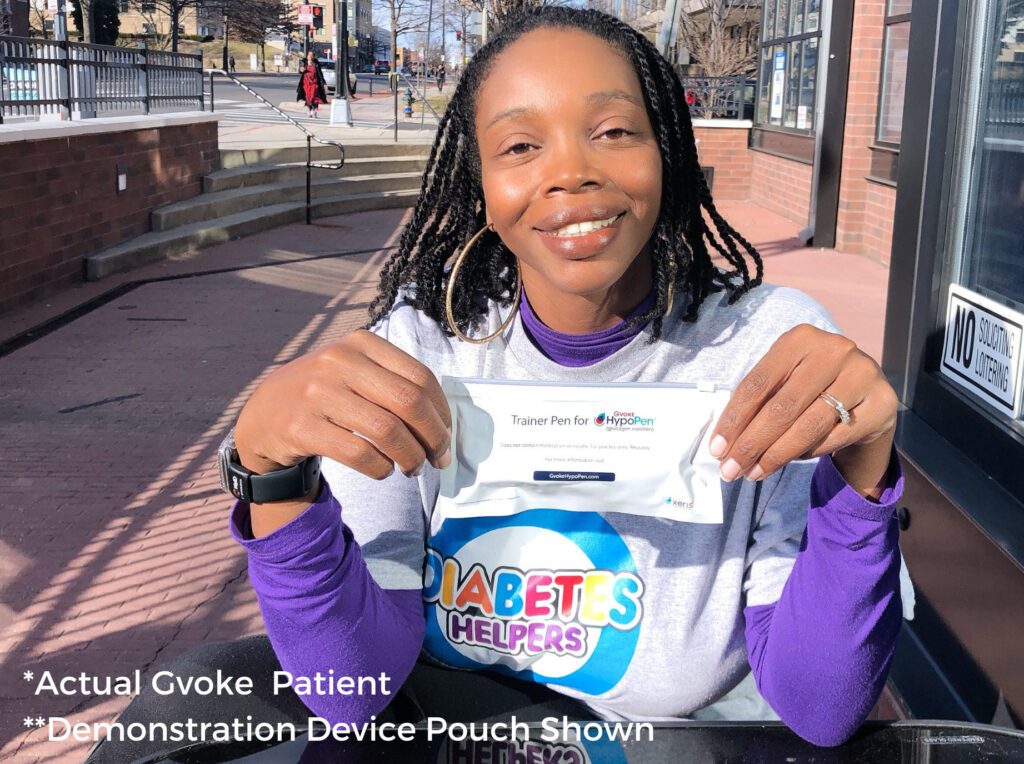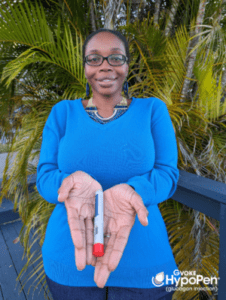I, too, can make a difference in diabetes

I didn’t know anything about diabetes before I was diagnosed. I was only aware of the stigma around the condition — it happened to “those people.” “Those people” were lazy, those people didn’t eat right, those people didn’t take care of themselves. Hearing the triage nurse in the ER tell me that I have diabetes was shocking. I thought, “how could this be?” I wasn’t lazy, I ate well, I was exercising, and I had shed nearly 50 pounds. I was devastated.

Then over the course of a week-long stay in the hospital recovering from extremely high blood sugar levels, I was given pamphlets about diabetes. I learned that the adverse health outcomes of diabetes disproportionately impact African Americans, and that the disease one of the leading causes of death for Black people in America. This wasn’t easy to read as a Black person newly diagnosed, so I looked to other Black people with diabetes for inspiration. When I read Patti LaBelle’s words, “I had diabetes, but diabetes wasn’t gonna have me,” I cried. I was uplifted by her words and by the stories of neo-soul artist Angie Stone and Daryl Coley, one of my favorite gospel artists. These African American legends were my inspiration for learning how to take care of myself and not allow diabetes to defeat me.
I’ve been living well with diabetes for more than a decade and I’ve had the pleasure to witness other phenomenal African Americans live their diabetes journeys out loud, such as Hollywood actor Anthony Anderson, TV talk show host Sherri Shepherd, lyrical genius Chaka Khan, and playwright Robbi McCauley. Robbie McCauley’s play, SUGAR, the first one-woman production about diabetes written and performed by an African American, was a major inspiration to me.
While there have been significant strides in care for African Americans living with diabetes, much room for improvement remains. One area I’d like to focus on in this blog is always carrying emergency glucagon. According to dQ&A, a leading diabetes market research company, African Americans are significantly less likely to carry glucagon than their white counterparts. It’s important to always have glucagon on hand if you are on insulin or if you take a sulfonylurea. Severe low blood sugar can strike at any moment, so we always need to stay prepared in case of an emergency.
Here is another way I’m doing better at managing my diabetes: checking those glucagon expiration dates. If you’re like I was years ago, you might have had the same glucagon kit for years, not knowing if it was expired or not. Just like with other medications, it is dangerous to use expired glucagon. Now, I take care of myself by making sure I see my doctor annually and always having my prescription for glucagon filled. My glucagon of choice is Gvoke HypoPen®. It’s a simple-to-administer glucagon rescue pen that is convenient to carry and has 24-month room temperature stability. Part of staying safe is also knowing that you or your loved ones will be able to administer glucagon if you need it, which is why I carry a premixed and ready-to-use treatment for severe hypoglycemia. Always keeping Gvoke HypoPen® with me and telling others about it are small ways that I’m working toward bettering health outcomes for myself and other African Americans who are living with diabetes.
Let’s all do better and have more of these important conversations with our friends and family so that we can all have peace of mind about severe low blood sugar. Join me in changing the statistics from African Americans being “less likely” to carry glucagon to being “as likely” to carry emergency glucagon by asking our doctors for a prescription and refilling it on time. Ask your doctor if Gvoke HypoPen® is right for you!
Source: dQ&A, The Diabetes Research Company, Ownership of Emergency Glucagon Kits, Survey. Q3, 2022.
INDICATION AND SAFETY SUMMARY
GVOKE is a prescription medicine used to treat very low blood sugar (severe hypoglycemia) in adults and kids with diabetes ages 2 years and above. It is not known if GVOKE is safe and effective in children under 2 years of age.
WARNINGS
Do not use GVOKE if:
- you have a tumor in the gland on top of your kidneys (adrenal gland), called a pheochromocytoma.
- you have a tumor in your pancreas called an insulinoma.
- you are allergic to glucagon or any inactive ingredient in GVOKE.
GVOKE MAY CAUSE SERIOUS SIDE EFFECTS, INCLUDING:
High blood pressure
GVOKE can cause high blood pressure in certain people with tumors in their adrenal glands.
Low blood sugar
GVOKE can cause low blood sugar in certain people with tumors in their pancreas called insulinomas by making too much insulin in their bodies.
Serious allergic reaction
Call your doctor or get medical help right away if you have a serious allergic reaction including:
- rash
- difficulty breathing
- low blood pressure
COMMON SIDE EFFECTS
The most common side effects of GVOKE in adults include:
- nausea
- vomiting
- swelling at the injection site
- headache
The most common side effects of GVOKE in children include:
- nausea
- low blood sugar
- high blood sugar
- vomiting
- abdominal pain
- headache
- pain or redness at the injection site
- itching
These are not all the possible side effects of GVOKE. For more information, ask your doctor. Call your doctor for medical advice about side effects.
You are encouraged to report side effects of prescription drugs to the FDA. Visit www.fda.gov/medwatch, or call 1-800-FDA-1088.
BEFORE USING
Before using GVOKE, tell your healthcare provider about all your medical conditions, including if you:
- have adrenal gland problems
- have a tumor in your pancreas
- have not had food or water for a long time (prolonged fasting or starvation)
- have low blood sugar that does not go away (chronic hypoglycemia)
- are pregnant or plan to become pregnant
- are breastfeeding or plan to breastfeed. It is not known if GVOKE passes into your breast milk. You and your healthcare provider should decide if you can use GVOKE while breastfeeding.
Tell your healthcare provider about all the medicines you take, including prescription and over-the-counter medicines, vitamins, and herbal supplements.
HOW TO USE
- Read the detailed Instructions for Use that come with GVOKE.
- Use GVOKE exactly how your healthcare provider tells you to use it
- Make sure your relatives, close friends, and caregivers know where you store GVOKE and how to use it the right way before you need their help.
- Act quickly. Having very low blood sugar for a period of time may be harmful.
- Your healthcare provider will tell you how and when to use GVOKE.
- After giving GVOKE, your caregiver should call for emergency medical help right away.
- If you do not respond after 15 minutes, your caregiver may give you another dose, if available. Tell your healthcare provider each time you use GVOKE. Low blood sugar may happen again after receiving an injection of GVOKE. Your diabetes medicine may need to be changed.
HOW TO STORE
- Keep GVOKE pre-filled syringe and HypoPen in sealed foil pouch until time of use.
- Keep GVOKE kit vial and pouched syringe together in original carton until time of use.
- Store GVOKE at temperatures between 68°F and 77°F.
- Do not keep it in the refrigerator or let it freeze.
Keep GVOKE and all medicines out of the reach of children.
For more information, call 1-877-937-4737 or go to www.GvokeGlucagon.com.
Please see the Full Prescribing Information for Gvoke